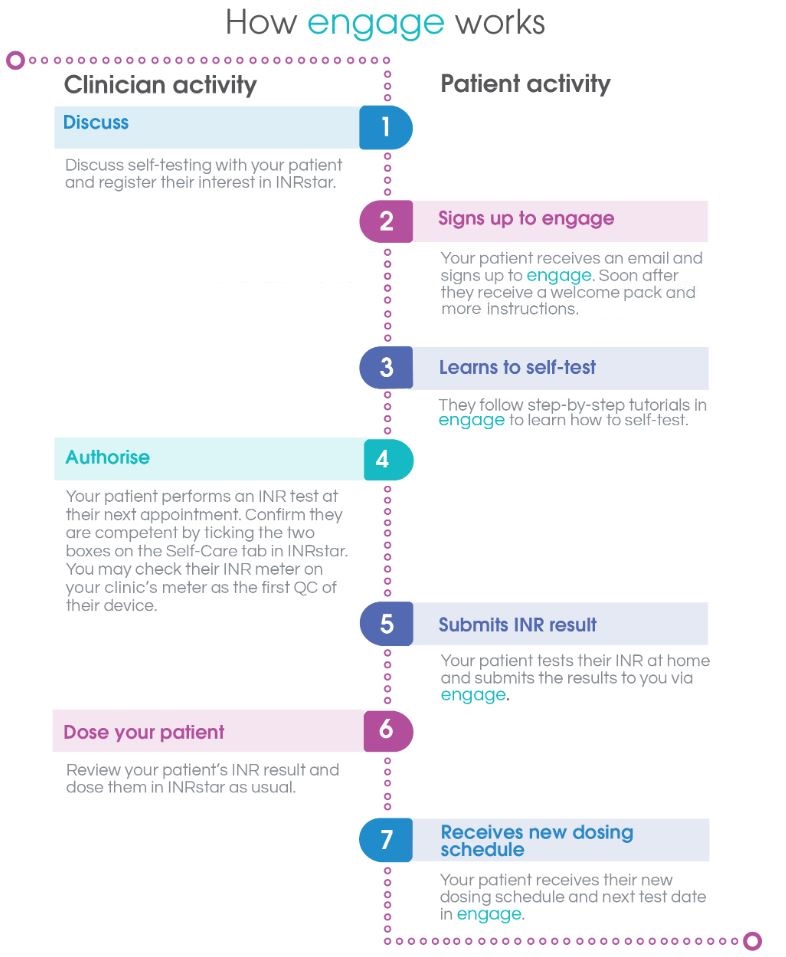Patient self-testing programme
What is self-testing with engage?
Building on 20 years of anticoagulation expertise in the NHS with INRstar, we are now developing a range of care programmes delivered via engage – an easy-to-use app designed to give individuals the knowledge, skills and confidence to gain freedom and feel more in control of their health.
Our first care programme offers a safe and cost-effective1 option for your patients to test their INR and receive their dosing instructions at home. There is no extra work for your team – we supply all patient equipment, training and support.

The engage app
Your patients learn how to self-test with step-by-step training and support via our easy-to-use, clinically risk assessed engage app. Once you confirm they are trained and competent, they can begin to self-test independently and send their INR result directly to INRstar via the app. You review the results and send them their new dosing schedule.
The engage app includes:
- Easy-to-follow education including videos and step-by-step training
- Full integration with Roche’s CoaguCheck XS and INRange
- Daily medication instructions
- Next test date reminder
- An on-hand, support team for patients and clinicians
- A developing community of engage self-testers on Facebook
Who can self-test?
NICE guidance2 recommends self-testing for patients on long-term vitamin K antagonist therapy who have atrial fibrillation or a prosthetic heart valve if:
- The patient prefers this form of testing
- The patient (or their carer) is able to self-test effectively
INR stability is not a requirement for self-testing according to NICE3, as patients with unstable INR may benefit from frequent testing. Additionally, patients with other conditions requiring long-term vitamin K antagonist therapy may also be suitable for self-testing.
To use the engage app your patient will need:
- A valid, unique email address and phone number
- Access to the internet
- A tablet, computer or smartphone
What benefits can you expect to see?
There is no extra work involved for your practice. engage manages the whole setup process for you. We supply leaflets to raise awareness in self-testing, the self-testing equipment and all the education and support your patients need.
engage enables your clinic service to:
- Help reduce missed appointments and home visits
- Help patients improve medication adherence
- Eliminate transcription error with full integration to the INRstar patient record and all Roche INR self-testing devices
- Potentially increase clinic capacity releasing time to focus on your patients4
NICE demonstrates improved patient outcomes including:
- Better INR control5
- More patients with a TTR of over 65%
- lowering the risk of adverse events including strokes5
- 48% reduction in risk of major thromboembolic events6
What are the benefits for patients?
Patients self-testing with engage benefit from:
Freedom to test wherever they are...*Patients must have access to an internet connection
- Fewer trips to the clinic
- Savings in time and money
- Less time off work to attend appointments
- Confidence to self-test at a convenient time and place
- Freedom to plan holidays and travel
Better control of their health...
- Improved TTR leading to fewer adverse events including stroke5
- Greater understanding of warfarin and how diet and lifestyle affect INR
- Built-in education and step-by-step tutorials to learn to self-test at their convenience
- Access to our experienced engage support team
- A growing community of self-testers via Facebook
How do I get engage?
Call us now on 01209 710999 or email us at engagesupport.engage@inrstar.com for more information.
References1. Cost-savings through avoidance of adverse events and increased dose accuracy https://www.nice.org.uk/guidance/dg14/resources/costing-statement-46621
2. www.nice.org.uk/guidance/DG14
3. Previous stability of INR is not a prerequisite to home testing – http://bit.ly/2tYUm43
4. From 2015 to 2016 the Isle of Wight CCG piloted self-testing with 78 out of 288 (27%) warfarin patients at a single practice. The figures below compare the 12 months before the trial started and the first 12 months of the trial. Time saving: On average 1.5 hours were saved per patient per year in clinic time. (Source: PSSRU 2016 Report).
5. 15 out of 18 trials showed self-monitors have improved TTR – www.nice.org.uk/guidance/DG14
6. Self-monitoring (self-testing and self-management) showed statistically significant reduction in the risk of thromboembolic events by 42% compared with standard care. The risk reduction further increased to 48% when only major thromboembolic events were considered – www.nice.org.uk/guidance/DG14
